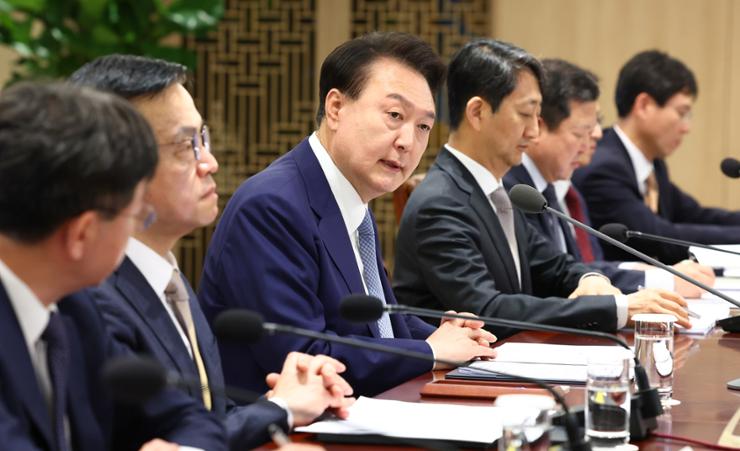
President Yoon Suk Yeol speaks during an economic issue review meeting at the presidential office in Seoul, Thursday. Yonhap
The government unveiled a 26 trillion won ($19 billion) package of comprehensive government support for the country's semiconductor industry, Thursday, to offer Korean companies a boost as competition intensifies among global chip manufacturers.
During a meeting on economic issues at the presidential office in Seoul, President Yoon Suk Yeol said the government-led initiative for the national chip industry will encompass support for a wide range of sectors related to the growth of the semiconductor business, including finance, infrastructure, research and development (R&D), as well as backing for small- to medium-sized enterprises (SMEs).
The announcement comes as many countries are vying to improve their chip industries and lure global semiconductor giants by offering subsidies.
Highlighting the semiconductor industry as a pivotal field marked by intense global competition, Yoon underscored the critical importance of bolstering and supporting the nation's chip industry.
"Countries' fates now depend on who can first produce cutting-edge semiconductors with highly advanced information processing capabilities. Korea should provide robust support for the semiconductor industry to ensure that we do not fall behind other rival countries in semiconductor development," the president said during the meeting.
Out of the total 26 trillion won, the government plans to allocate 17 trillion won for financial assistance aimed at aiding companies establish large-scale chip infrastructure. Yoon explained that this fund would alleviate liquidity constraints encountered by industry players, considering the substantial investments required for constructing new chip manufacturing facilities.
Furthermore, the government will implement various tax incentives, through which a portion of the R&D and facility investment costs will be reimbursed to companies.
Responding to criticism that the government's support plan for the semiconductor industry primarily targets tax cuts for large corporations, Yoon said, "Over 70 percent of the benefits from this comprehensive support program will be directed toward SMEs."
The president also pledged that the government and public sector will assume responsibility for enhancing essential infrastructure necessary for the further advancement of the semiconductor industry, including electricity, water, and road networks.
"Above all, the most critical factor in semiconductor production is providing a stable and high-quality electricity supply. I urge the government to talk with the National Assembly to promptly pass the Special Act on the National Power Grid in order to expedite the construction of transmission lines," Yoon said.

President Yoon Suk Yeol speaks during an economic issue review meeting at the presidential office in Seoul, Thursday. Yonhap
The president also promised to expedite the construction of a semiconductor mega-cluster currently under way in Yongin, Gyeonggi Province, with completion expected by 2047 and investments totaling 622 trillion won from companies like Samsung Electronics, SK hynix, and others to build 16 new fabs.
A semiconductor ecosystem fund, valued at 1 trillion won, will also be established to provide support to promising fabless companies, as well as materials, parts, and equipment makers, enabling them to evolve into global entities.
The president also urged relevant ministries to come up with strategic plans to strengthen the national competitiveness of system semiconductors — chips that control logic, calculations and other functions to handle digitized data.
Yoon said it is very important to proactively respond to global market changes and open a new future for the semiconductor industry.
"Korea's semiconductor industry has dominated the global market in the memory sector during the past 30 years. However, the success of the semiconductor industry in the future will be determined in the system semiconductor sector, which accounts for more than two-thirds of the overall chip market. Thus, Korea must make a decisive move in further developing the system semiconductor field, which is continuously expanding beyond CPUs and GPUs to AI semiconductors," Yoon highlighted.
Several ministers took part in Thursday's meeting, including Finance Minister Choi Sang-mok, Trade Minister Ahn Duk-geun, Science and ICT Minister Lee Jong-ho, Environment Minister Han Wha-jin, Land Minister Park Sang-woo, as well as Financial Services Commission (FSC) Chairman Kim Joo-hyun.

 Subscribe
Subscribe E-Paper
E-Paper
